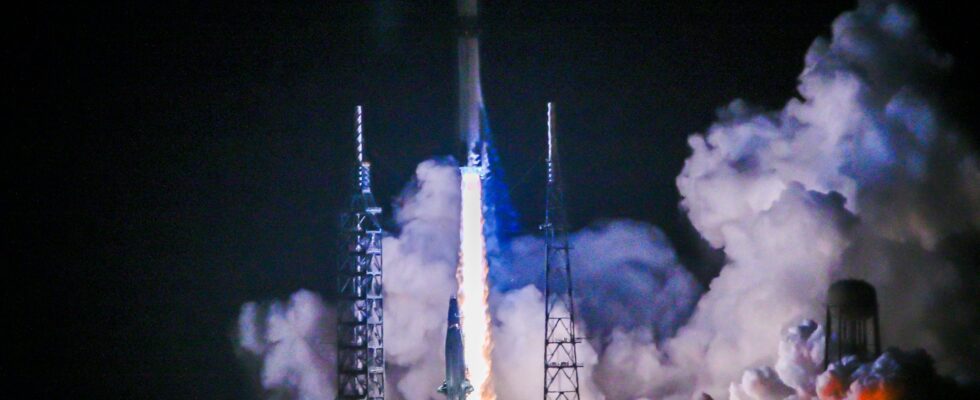The Blue Origin space company of Amazon founder Jeff Bezos carried out its first flight into orbit in more than 20 years of existence on Thursday, January 16, thanks to its new New Glenn rocket, whose first launch ushered in a turning point for the company and the private space industry. 98 meters high, the size of a building of approximately 30 floors, New Glenn successfully took off around 2:03 a.m. local time (8:03 a.m. French time) from the Cape Canaveral space base in Florida.
The maiden flight of this powerful rocket, partly reusable, had been awaited for years and had been postponed several times. The mission has achieved its “main objective”, namely putting the second stage of the rocket into orbit, announced Ariane Cornell, a Blue Origin executive during a live broadcast. This was the company’s ambition. “We did it!”, rejoiced its CEO David Limp on X. “Anything that goes beyond that is a bonus,” he said before the launch.
If the company has already been taking tourists for a few minutes into space with its New Shepard rocket for several years, it has not yet carried out any orbital flight. Multi-billionaire Elon Musk, boss of the company SpaceX which currently dominates the market with its Falcon9 and Falcon Heavy rockets, was quick to greet his rival Jeff Bezos. “Congratulations on reaching orbit on the first attempt!” Elon Musk posted on his X platform to Jeff Bezos. “Thank you,” the latter replied.
Delay on SpaceX
The two Silicon Valley figures each founded their space companies in the early 2000s, but Blue Origin has progressed at a much slower pace than SpaceX, in part because of a more cautious approach to design. With his new New Glenn rocket, much more powerful, Jeff Bezos, however, aims to enter the new market of launching commercial and military satellites into orbit as well as spaceships and astronauts, and thus compete with SpaceX. However, Elon Musk’s company is developing the largest and most powerful rocket ever designed, Starship, which, by coincidence or not, is due to carry out a seventh test flight later on Thursday.
In addition to entering orbit, Blue Origin intended to attempt during this first flight the recovery of the first stage of its rocket, the booster, by landing it in a controlled manner on a barge at sea, a complex maneuver similar to those carried out by SpaceX, which however did not get there the first time. But minutes after launch, Ariane Cornell confirmed that the teams had “lost the propellant.” “You can see on this map how close he was to landing,” she continued. Like SpaceX’s Falcon 9, the New Glenn rocket was designed to be partly reusable, a specificity that would allow the company not only to reduce costs but also to have a higher flight rate.
The second stage of New Glenn, which reached orbit, carried a prototype of the Blue Ring multipurpose tug, a spacecraft intended to perform operations in space and move satellites to their final orbits.
A plan B “in case of problems”
After this success, other New Glenn flights are expected to follow in 2025. Blue Origin has already signed contracts with several clients, including the American space agency for an unmanned mission to Mars, and the American government for security missions. national. On the commercial side, it plans to deploy internet satellites for several companies.
It should also, like SpaceX with Starlink, be responsible for launching satellites from the Amazon group. Jeff Bezos and Elon Musk, the two richest men in the world, are also fighting in the field of satellite internet.
For George Nield, president of a company promoting private space activities, this launch is good news for the entire space sector, because “it’s a good thing to have competition, to have choice” . “This is very important for the commercial space industry, but also for the government and NASA” because it not only reduces costs, but also offers a plan B “in the event of a problem with a device,” he explained to AFP before the flight.
